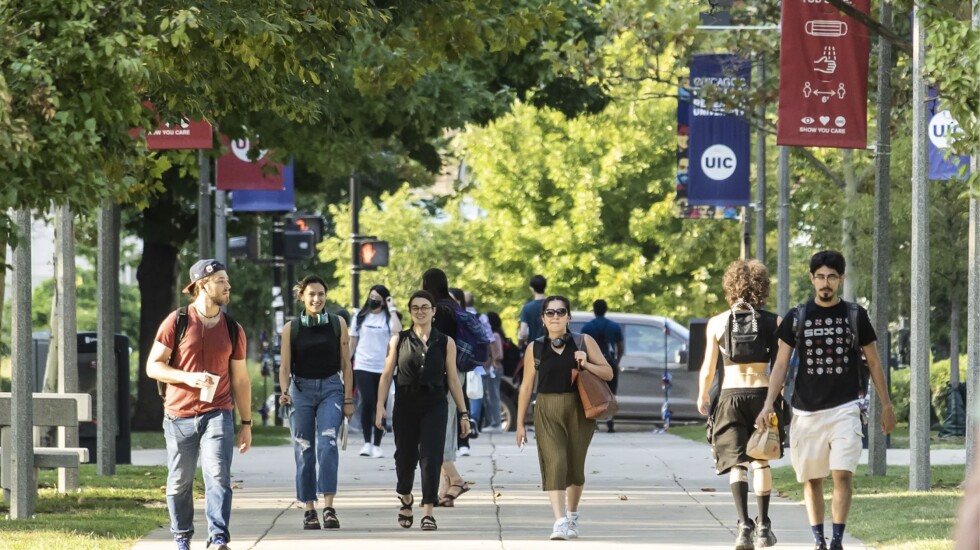
The ballooning mental health crisis affecting college students across the country has become a focal point of stalled faculty contract negotiations at the University of Illinois Chicago.
Faculty union members who are threatening to strike Tuesday are asking for increased pay in part to compensate for larger workloads they say have resulted from their students’ heightened mental health needs. They are also asking the university to provide free psychological and neuropsychological testing for struggling students.
“Right now, UIC faculty are winging it …and I’m not trained on how I should be supporting these students. I didn’t get a degree in that,” said Charitianne Williams, a senior lecturer who serves as her union’s communications officer. “I have a degree in English.”
Strikes and strike threats are not uncommon at public universities in Illinois. Faculty at all three University of Illinois campuses have gone on strike in the last decade. What’s unusual is the focus on student mental health and how it impacts faculty’s ability to do their jobs.
Mental health among college students was already headed toward a breaking point before the pandemic hit. Then courses went online and students faced increased isolation and anxiety. According to a national survey called the Healthy Minds Study, a majority of college students met the criteria for at least one mental health problem following the onset of the pandemic.
“Student mental health is the poorest I’ve ever seen it in [sic] my career at UIC, and I started there as a graduate student in 2001,” said Williams.
A majority of the UIC United Faculty’s 900 members voted to strike if an agreement with university administration is not reached. The last bargaining session is set for Thursday afternoon.
As of Tuesday, there was a nearly $10,000 discrepancy between the union’s requested minimum pay and what management has put on the table, according to the faculty union.
In addition to increased compensation, faculty union members want UIC to provide free testing for conditions like ADHD, autism and depression to students who have not previously been tested or diagnosed and who are experiencing significant academic distress. This service is currently provided at the University of Illinois at Urbana Champaign.
Faculty involved in negotiations say university leaders have told them contract negotiations are not the right place to hash out student issues. State law allows public university administrators to refuse to bargain about anything not related to compensation or working conditions.
The university did not respond to a request for comment. A statement posted on the UIC website addresses the issue of faculty salaries, but not student mental health supports: “This kind of salary commitment — without a significant increase in the state appropriation or in undergraduate tuition revenue — would lead to severe deficits in nearly all of the colleges and cause significant financial hardship throughout the university.”
Faculty union negotiators maintain student mental health does affect working conditions. Kate Floros, a political scientist at UIC, said she spends a significant amount of time accommodating her students, from those who need to get caught up on work, to those who need all their exams rescheduled as a result of mental health challenges.
“Because students have such different needs, it’s like creating individual plans,” she said.
Williams said she has to study up on how best to support her students, which has added hours of work to her weekly schedule.
“I regularly have students just breaking down, and not even just in my office anymore,” she said. “It used to be, the student was having a hard time, they would keep that stiff upper lip until we got into private. But now, students are so overwhelmed sometimes … they’ll start crying in class.”
That brings learning to a halt, she said.
“All that material has to be delivered in a different way at a different time in a different order,” she said. “Then I have to support that student, and I have to support the students around them because those other students are probably feeling very similarly.”
The UIC faculty union’s push for mental health support for students reflects a rise in social movement unionism on campuses across the United States and Canada, according to Tim Cain, an associate professor of higher education at the University of Georgia.
“There’s a broader push to improve conditions not just of union members, but the conditions of the larger institutions and society,” he said.
If student conditions affect faculty work conditions, Cain said, then the case can be made that they should be part of contract negotiations.
“If I’m spending my time as an untrained counselor to students, trying to help … navigate missing classwork and dealing with other mental stresses, and it’s affecting my job and making my job more difficult, then it is a working condition,” Cain said. “And [the] administration might say, ‘Well, no, that’s over here, and it’s excluded from bargaining.’ ”
UIC faculty union members have been in talks with university administrators since last spring. Their 2019 contract expired in August. It was signed a day before faculty were set to walk out.
Lisa Philip covers higher education for WBEZ, in partnership with Open Campus.







